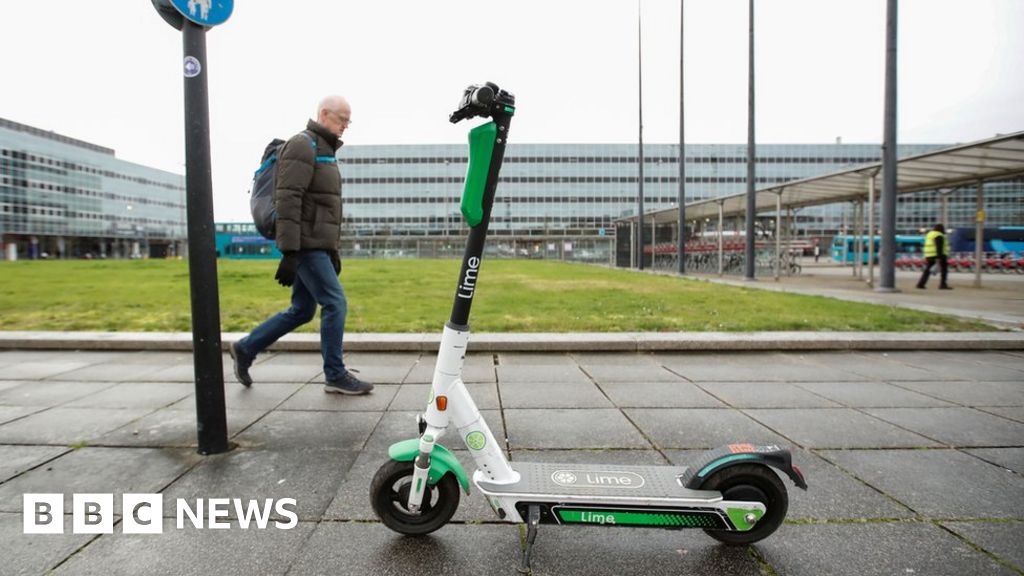e-Scooters? OK – but not on the pavements
Pink e-Scooters have been a common sight around Headington since the start of the 12-month trial this February. But the recent addition of designated e-Scooter bays has drawn attention to where they’re stored: on our already crowded pavements.

Headington Liveable Streets welcomes any new mode of transport that helps reduce the congestion, road danger and pollution caused by motor traffic. However, in our response to the County Council’s consultation accompanying the e-Scooter trial, we asked why they’re being stored on pavements rather in designated parking areas on the road, where they’re required to be used (see our full response to the consultation below).
We’re concerned that the on-pavement parking bays present an additional hazard for people who are sight-impaired, have mobility difficulties or use wheelchairs, mobility scooters or other mobility aids. This chimes with feedback we received from Oxfordshire Association for the Blind.
Our view is that if the Council intends for e-Scooters to replace car use, it must reinforce this message by reassigning car parking spaces to e-Scooter parking rather than encroaching on our already crowded pavement space. Several e-Scooters could be stored in the space taken up by a single parked motor vehicle. This seems to be the approach taken in other locations (see image used in OCC’s own article, below).
Lesser of two evils?
While we share residents’ legitimate concerns about the use of e-Scooters on pavements, we’re also wary of allowing e-Scooters to overshadow a far more widespread problem which is now so commonplace that many of us barely even register or question it anymore: pavement parking.
e-Scooters may be the new kid on the block, but pavement parking is a far longer standing and, it seems, ever increasing hazard for anyone walking, wheeling or using pushchairs around Headington, with vehicles sometimes completely blocking already narrow pavements and forcing pavement users onto the busy roads.
How to report pavement parking in Headington:
- Call Pavement Parking Civil Enforcement (Conduent) on 0345 337 1138 and wait for option 4 to be put through to the control room
- Report the location of the problem and let them know an operative is needed urgently
These articles provide some background information and a user’s perspective on the e-Scooter trial:



Headington Liveable Streets’ full response to the Headington & Marston Areas (Oxford) Experimental Traffic Management (E-scooter Trial) consultation is below:
Although we support e-Scooters as a replacement for car journeys to reduce congestion, pollution and road danger, we are disappointed that the County Council has decided that the e-Scooters be stored on pavements, rather than in designated bays on roads, where they are required to be used, and is not actively enforcing the ban on people riding them on pavements. If the Council intends for e-Scooters to replace car use, it must reinforce this message by reassigning car parking spaces accordingly.
When parked, the e-Scooters obstruct the pavements, causing danger and inconvenience to vulnerable pavement users who are not themselves able to benefit from the e-Scooter trial – people who are sight-impaired, have mobility difficulties or use wheelchairs, mobility scooters or other mobility aids. The new painted boxes that have recently appeared indicating the storage areas do nothing to alleviate the problems experienced by such pavement users. This compounds the ongoing widespread problem of motor vehicle parking on pavements in Headington.
People riding e-Scooters on pavements presents a risk and worry to all pavement users, but particularly for the most vulnerable pavement users who might be unable to take evasive action or be more likely to fall or suffer injury if crashed into.
We have received feedback from Oxfordshire Association for the Blind that their clients are actively avoiding areas where the e-Scooters are stored and used and are having to use other modes of transport because the scooters cause such an issue, pushing their clients into cars and causing great anxiety and stress.
We would ask that the e-Scooters be parked on roads rather than pavements. Since they are not legally allowed to be ridden on pavements, and are intended to replace car journeys, we would suggest that they be stored within existing car parking spaces on the roads near their current storage spaces. The e-Scooter parking spaces could be indicated with painted signage on the road similar to that currently being used on pavements, along with fencing or bollards to protect the spaces from being used by cars.
Given the apparent disproportionate negative impact of the e-Scooter trial on disabled people, was any kind of equality impact assessment carried out in respect of the trial, and if so, could we please see a copy of it?
Title image: Oxford Mail

